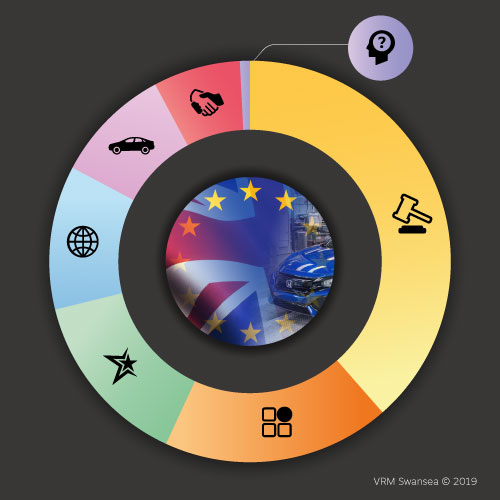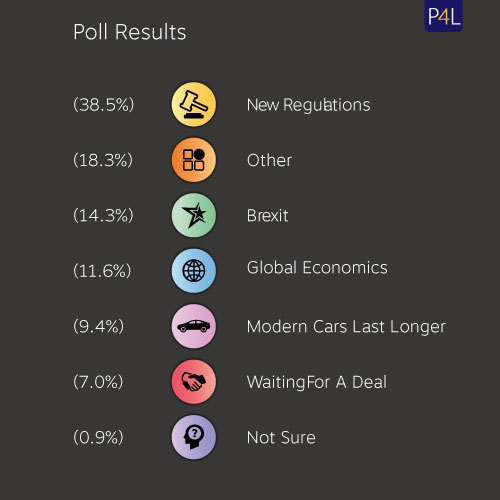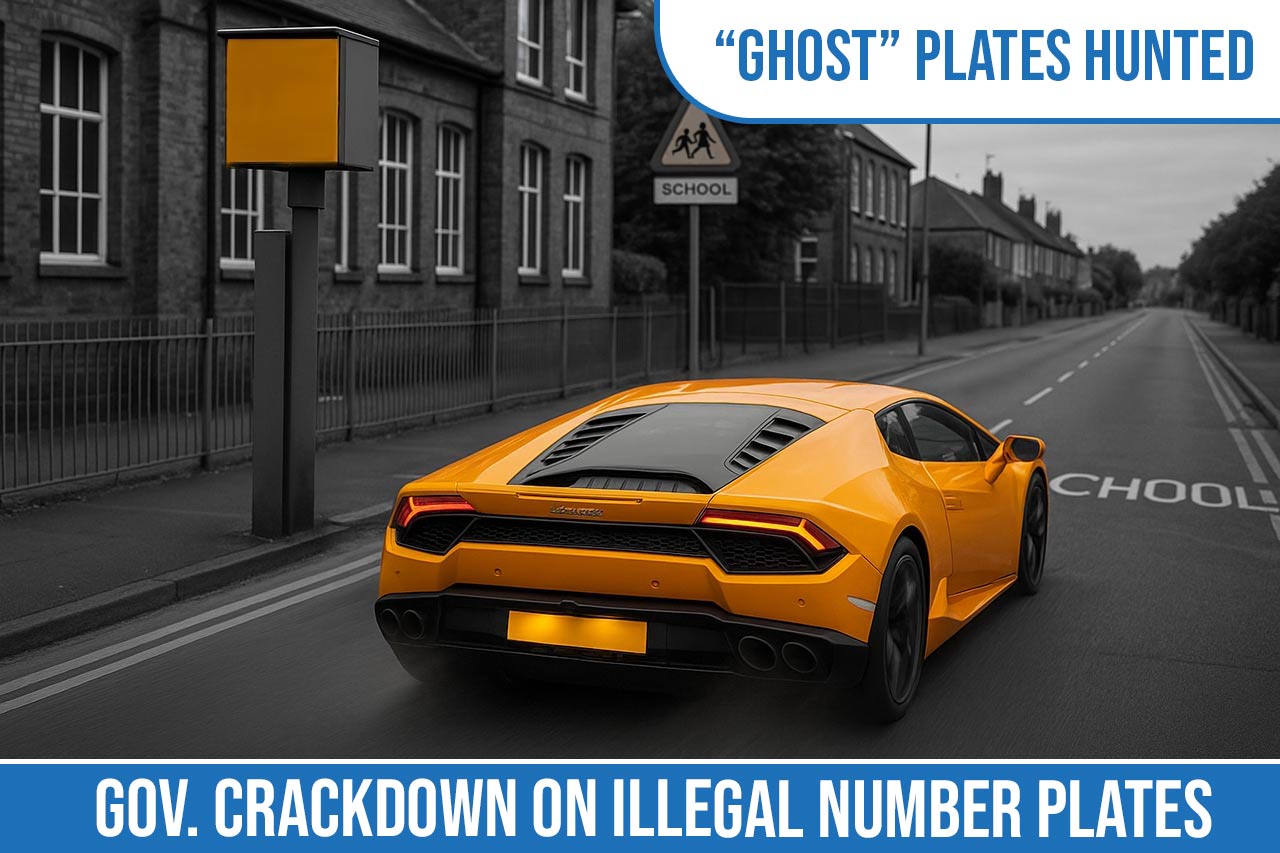What's happened to the UK Motor Industry?

Having presented a poll as part of a Facebook campaign, we discovered a range of views regarding what might be affecting the UK’s once-flourishing motor industry. We recently wrote an article (original article) exploring some of the possibilities affecting the sales of new cars in the UK, putting a poll to our readers and customers to determine what they believed to be the main cause of this decline in the motor industry. Was it Brexit? The new diesel regulations? Or were wider global concerns the main issue?
As the motor industry brings more than £20 billion into the UK economy, not to mention the thousands of jobs it provides, its current decline is certainly some cause for concern, with several companies changing their investment plans or even relocating their businesses. We wanted to see what people in the general public thought about this, targeting men and women over the age of 18 with an interest in motor vehicles and politics via our Facebook campaign.


Tabulated results of the poll Pie chart displaying results of poll Although Brexit is often blamed in the media for this decline in the industry, only 14.3% of those polled agreed, while 7% thought it was more the uncertainty surrounding the specifics of a Brexit deal that was responsible rather than the promise of Brexit itself. However, as you might expect, just as there were those who blamed Brexit, there were plenty who pointed out it couldn’t be entirely responsible because other European countries - such as Germany - are experiencing similar problems with their motor industry while world leaders in the field such as China are also suffering. Indeed, 11.6% of the poll results put the motor industry’s decline down to the wider global economic issues.
The most popular opinion, with 38.5% of the results, was that new government regulations had made a significant impact. Attitudes towards diesel have shifted, for example, with new rules regarding emissions making it a fuel to shy away from, while expected developments regarding electric cars mean some people are holding back to see what the future might bring before they commit to a new vehicle. In fact, of the 18.3% selecting ‘other’ as their answer, most noted the potential evolution of electric cars as a major factor.
That said, 9.4% believe the decline in new sales is because the cars made in recent years simply last longer these days, meaning there is less need to replace them with newer models.
Whatever the reason, it seemed almost everyone had an opinion as to what the reason might be, one way or the other, with those who weren’t sure of an answer making up less than 1% of the poll.
One of the things so many comments did confirm was that people are, indeed, refraining from changing or upgrading their vehicles. To some extent this appears to be due to the cost involved, with some commenting that new cars are unaffordable without resorting to finance, especially as there hasn’t been much change in people’s income. As one person noted, however, a credit model economy is only a short-term fix; it stimulates the market initially but ultimately results in limited income for future purchases further down the line. Regarding the cost, people also noted how a car depreciates as soon as you drive it away from the dealership, while others noted how difficult new cars are for the owners to repair or maintain themselves, adding an ongoing expense to the purchase due to a necessary visits to mechanics with specialist tools and skills.
Another popular opinion was that an anti-car sentiment exists amongst the younger, more environmentally-conscious, generation. The ‘diesel-gate’ aspect was noted again, while others added that some people simply did not want to drive these days, not only because of the environmental or financial cost but because of the poor state of the roads and the lack of suitable (affordable) parking.
We certainly did not expect a definitive answer regarding what might be causing a decline in the motor industry, and sure enough the range of aspects people considered to be having an impact was wide, and far from exhaustive. Though some articles seem incline to focus on Brexit - it’s a hot topic, sure to interest readers – it’s seems apparent that the issue is more complex than that, and that the British people hope it gets resolved soon.
Some of the Facebook Comments - Click the names to see original comment!
Beverley I personally think it’s because of the transition of people from DLA to PIP and people already on PIP who had the high rate of Mobility and used the money for mobility cars and lost the high rate or where downgraded to low rate so therefore cannot afford the cars anymore or won’t in fear of losing them! Also zero hour contracts are to blame as well as people aren’t getting the consistent wages to pay for a car each month!
Paul New cars are too expensive and not good value, and decent cars run for longer if taken care of so less people buy new😉 I have a 2005 Toyota and it’s more exciting and more reliable than a lot of newer cars😉
Debbie Nothing to do with Brexit. I’ve worked in the industry for years. My company has been withdrawing from Britain for many years, moving plants to Europe for cheap labour.
Steve Its not due to Brexit because Brexit has not happened—Its due to the politicians leaving uncertainty for our manufacturers—They dont know where they stand—If Article 50 had been signed in July 2016 which would have given the Two Year Period to re adjust-That would have taken us out of the EU, Customs Union and all the rules and regs that went with it by July 2018. By now every thing could have been dealt with.
Anthony The companies themselves tell you it’s not because of Brexit. The demise of the combustion engine is why we getting a change. Companies gearing up for the new electronic cars. So we dont need engine factories. But we will need factories to build the new parts. BMW, Jag, Toyota, have all said any changes is due to global changes in the market. Nothing to do with Brexit.
Shaun I have a daughter of 23 who has zero interest in ever owning a car. She and her partner use Uber when they go out. Which isn’t often anyway. Young people have much less interest in cars than their parents did.
Eleanor Cost, pure and simple. The cost of living is going up and wages stay the same or fall – comparatively. My car is 10 years old, and I can’t see me getting another one unless I come up on the lottery.
We hope you’ve enjoyed this piece. We’re happy for you to use or share this article, but if you do so, please link back to the original work. Thank you.
Latest articles

New Government Number Plate Proposals Risk Fueling Illegal supply
View article
Private Number Plates: The Perfect Christmas Gift
View article
Plates4Less Celebrates 25,000 Five-Star Excellent Reviews: Why We’re the UK’s Favourite Private Number Plate Supplier
View article